- Home
- Technical Cooperation Projects
- Index of Countries
- Asia
- Timor-Leste
- The Project for Increasing Farmers Households' Income through Strengthening Domestic Rice Production in Timor-Leste
- Project News
- [No. 33] The CAAKUB has started to buy domestic rice from farmers in Maliana II in the first cropping of this year!!
Project News
2018-04-20
[No. 33] The CAAKUB has started to buy domestic rice from farmers in Maliana II in the first cropping of this year!!
As the harvest in Maliana I is largely expected to take place in less than a month from now, the CAAKUB has recently taken another alternative to resupply its current stock of domestic rice by purchasing it from farmers in Maliana II. Generally, farmers in Maliana II start the land preparation and harvest a bit earlier than in Maliana I since they heavily rely on the rain water to irrigate their paddy fields. It will be seen as an advantage for the CAAKUB to buy rice from Maliana II since it can continuously lead to meet its customers' demands in Dili, while farmers in Maliana II can also benefit from the CAAKUB.
Currently, the CAAKUB needs around 15.5 tons of domestic rice of which 1.5 tons will be used for resupplying its current stock for sales at MAF, while about 14 tons will be used for the launching event of its sales to four restaurants and a hotel in Dili in the late May.
Mr. João Barreto (36), Manager of the CAAKUB warehouse said that as a domestic rice supplier, the CAAKUB must regularly stock up its supplies to gain trust from its customers. He recognized that the restocking is one of the on-going issues which require immediate solutions by the CAAKUB. In addition, he said that buying the rice from Maliana II can also help the CAAKUB build its good relationships with the farmers there. In other words, if the CAAKUB needs to stock more rice in the future than can be supplied by Maliana I, it knows who should be contacted to buy domestic rice in Maliana II.
Mr. Shinji Hironaka, the Japanese Expert on agricultural distribution and sales, said that one of the Project's primary goals is to increase the farmers' household income, therefore he asked the CAAKUB to limit its purchasing amount to 1 ton per household so that as many farmers as possible can have equal opportunity to sell their rice. Furthermore, Mr. Hironaka mentioned that in order to get confidence from its new buyers such as restaurants and hotels in Dili, quality of the rice should be most prioritized by the CAAKUB, considering several important matters such as buying rice directly from the paddy fields, measuring moisture level of the rice and ensuring good system of distribution and sale.
Ms. Constantina Martins (60), a farmer from Holsa village, Maliana II was very pleased to sell her rice to the CAAKUB for the first time. She said that since she cultivated her paddy field only once a year, she sold to the CAAKUB only half of what she produced while keeping the rest for self-consumption until the cropping of the next year. She said that if the harvest is good in the next year, she will ask the CAAKUB to come back. On the other hand, Mr. Elizio Lopes (35), another farmer from Maliana II who was also selling his rice to the CAAKUB said that although his paddy field greatly depends on the rain water, if the CAAKUB comes back next year, he would like to produce more for sales.
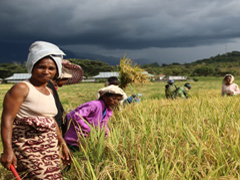 Farmers from Maliana II start harvesting.
Farmers from Maliana II start harvesting.
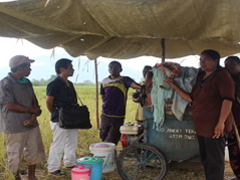 The CAAKUB and Project team visiting farmers in the paddy fields.
The CAAKUB and Project team visiting farmers in the paddy fields.
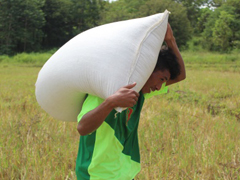 A farmer from Maliana II carrying his paddies to the collection point.
A farmer from Maliana II carrying his paddies to the collection point.
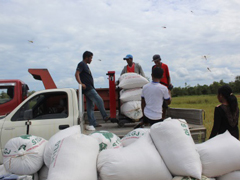 The CAAKUB weighs the quantity of paddies before loading them into the truck.
The CAAKUB weighs the quantity of paddies before loading them into the truck.
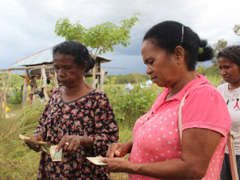 Farmers from Maliana II are being paid by the CAAKUB after selling their paddies (1).
Farmers from Maliana II are being paid by the CAAKUB after selling their paddies (1).
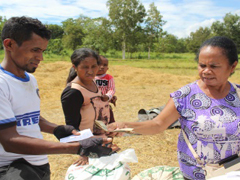 Farmers from Maliana II are being paid by the CAAKUB after selling their paddies (2).
Farmers from Maliana II are being paid by the CAAKUB after selling their paddies (2).
- About JICA
- News & Features
- Countries & Regions
- Our Work
- Thematic Issues
- Types of Assistance
- Partnerships with Other Development Partners
- Climate Change / Environmental and Social Considerations
- Evaluations
- Compliance and Anti-corruption
- Science and Technology Cooperation on Global Issues
- Research
- JICA Development Studies Program / JICA Chair
- Support for the Acceptance of Foreign HRs / Multicultural and Inclusive Community
- Publications
- Investor Relations
